
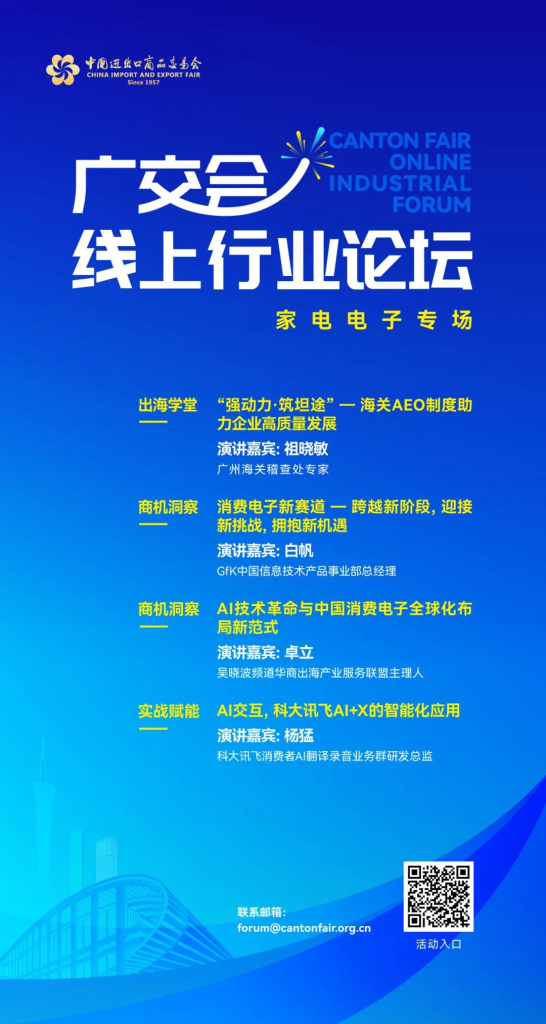
The Canton Fair’s June online forum will focus on the home appliances and electronics industry, exploring how to leverage policy advantages, identify cutting-edge business opportunities, and harness technological revolution to empower enterprises in navigating challenges and securing new global growth prospects – simply scan the QR code on the poster or click the article link to join the session! (See excerpted text below for details)
1.Customs clearance empowerment, accelerating global expansion
Ms. Zu Xiaomin, Expert from Guangzhou Customs Audit Department, delivered a keynote speech titled “Empowering Growth, Paving the Way Forward–How Customs AEO Program Fuels High-Quality Enterprise Development”. The presentation provided an in-depth interpretation of the AEO system’s latest achievements and practical approaches in facilitating international trade and enhancing enterprises’ global competitiveness.
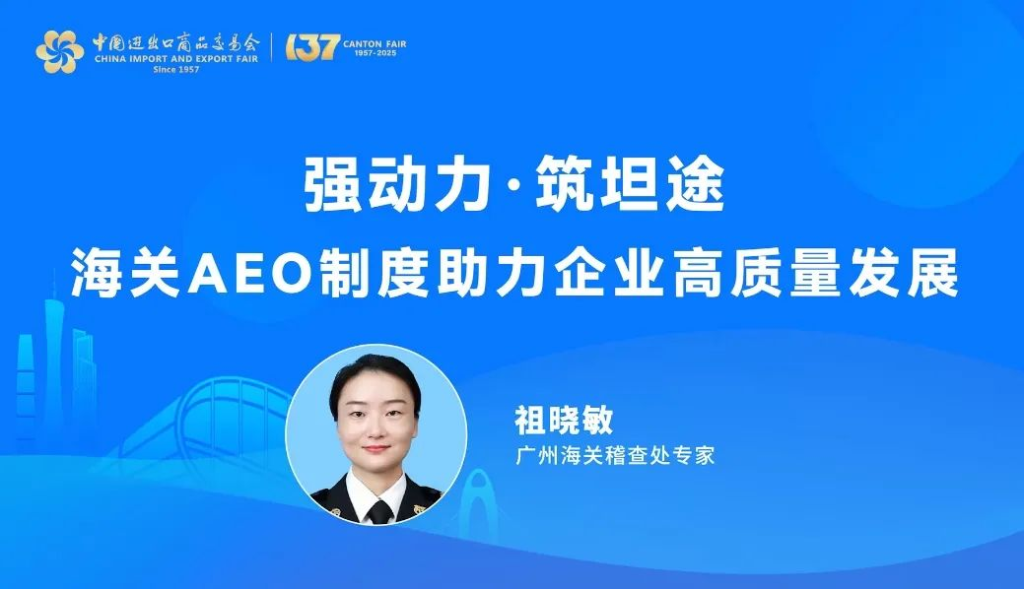
Ms. Zu Xiaomin highlighted that since China initiated the AEO mutual recognition process in 2012, it has now been implemented with major trading partners including the EU, Singapore, Japan, and South Korea, with formal implementation scheduled for 2025 with countries such as Mongolia and Ecuador. The active promotion of AEO mutual recognition by customs authorities delivers significant benefits: enterprises gain expedited customs clearance in partner countries, enhancing international competitiveness; redundant on-site inspections by different national customs authorities are eliminated, reducing enforcement costs; it facilitates the establishment of globally consistent supply chain security standards and procedures; improves transparency through the creation of compatible security supervision platforms and information/intelligence sharing mechanisms; and ultimately promotes both security and facilitation in international trade.
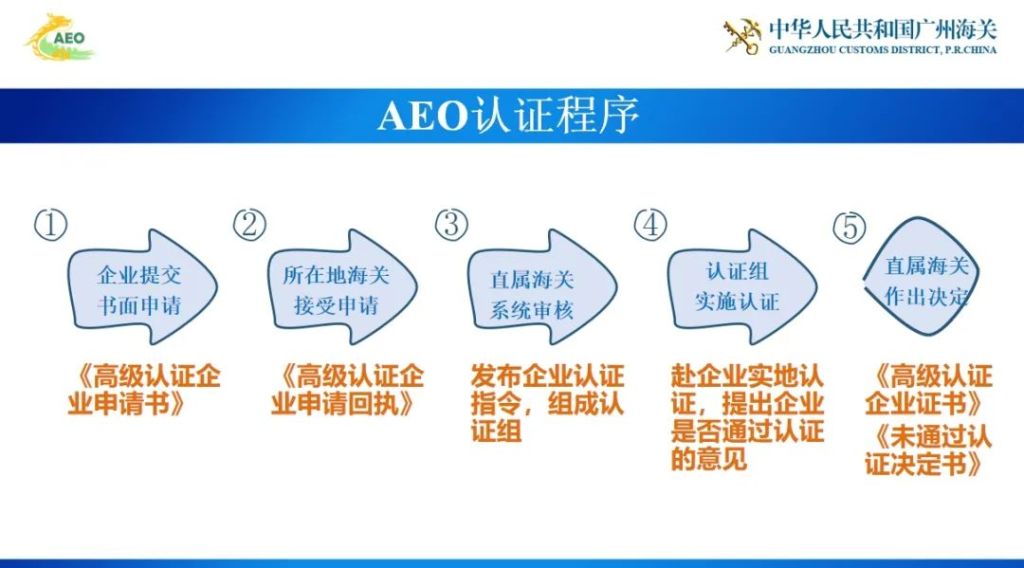
Domestic policies are simultaneously unleashing dividends as the National Development and Reform Commission, General Administration of Customs and 38 other ministries jointly signed the Cooperation Memorandum on Implementing Joint Incentives for Advanced Certified Enterprises, offering 49 preferential measures across six categories including green channels, reduced inspections and streamlined procedures, while customs authorities will provide five-dimensional facilitation covering priority processing, reduced inspection frequency, lower clearance costs, shortened processing time and optimized services to help enterprises transform compliance management into international competitive advantage.
2.High Volume, Thin Margins: AI Disrupts the Game
Zhuo Li, Director of the Overseas Chinese Business Alliance at Wu Xiaobo Channel, delivered a keynote speech titled “The AI Revolution and New Paradigms for Chinese Consumer Electronics’ Global Expansion,” using data to demonstrate the inevitability of internationalization while projecting new opportunities for consumer electronics through AI.
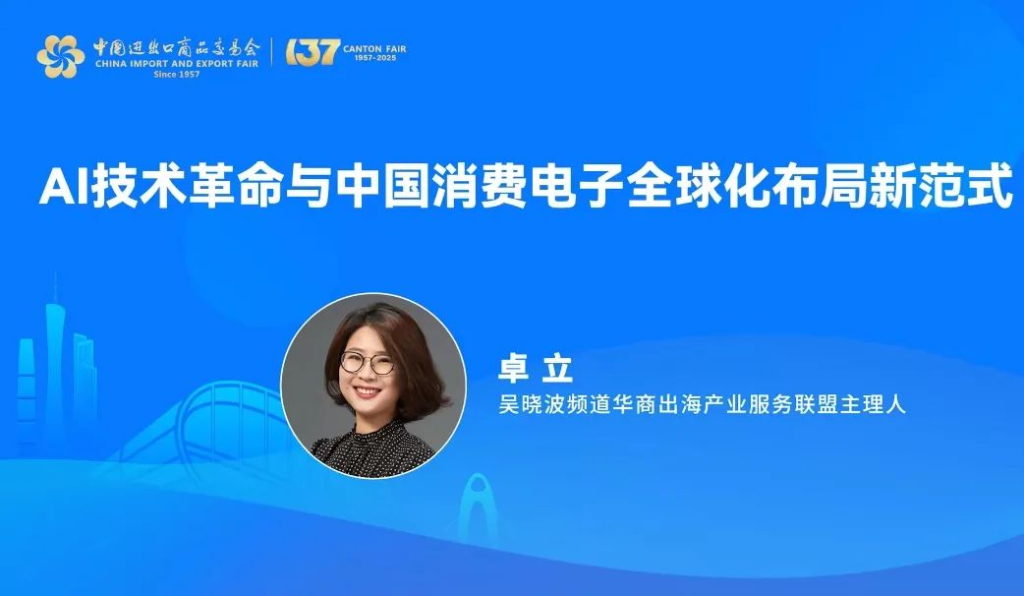
Zhuo Li pointed out that the long-standing imbalance between volume and profitability in the consumer electronics industry may find a breakthrough opportunity with the development of AI technology. Taking smartphones as an example, while Chinese brands accounted for 63% of global shipments in the past, they captured only 3% of profits – with Apple and Samsung seizing 97% of profits from just 37% of shipments. Today, China has achieved a complete closed-loop from AI R&D to application, giving rise to new product forms like AI PCs and AI smartphones.

Historical patterns reveal that smartphones and 5G technology once drove cyclical surges in chip sales, and the current AI revolution may similarly stimulate new growth in consumer electronics. Particularly in emerging markets like Southeast Asia and the Middle East, Chinese brands are rapidly displacing traditional giants, entering a critical window for premium market breakthroughs.
3.Technological Synergy, Scenario Innovation
Bai Fan, General Manager of GfK China’s IT Products Division, delivered a keynote speech titled “New Tracks in Consumer Electronics – Advancing to New Stages, Embracing New Challenges, Seizing New Opportunities”, analyzing how China’s consumer electronics market is reshaping the global industry landscape through dual drivers of “technological upgrading + policy dividends” amid the intersecting waves of globalization and AI revolution.
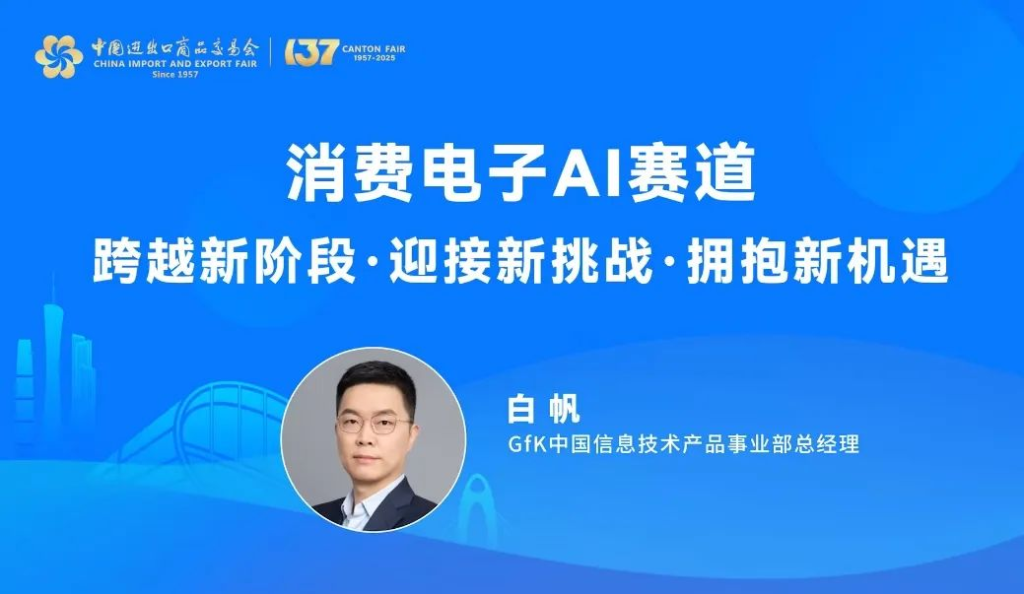
Bai Fan highlighted that the global consumer electronics market (excluding North America) reached an ¥800 billion revenue scale in 2024, marking a 1.4% year-on-year growth. The sector exhibits polarization: while the IT/office segment continues declining due to post-pandemic demand saturation, communication devices (including smartphones/wearables), traditional AV equipment, and major/small appliances maintain growth. Imaging products (cameras/action cameras) show the fastest growth rate though remaining a relatively small market share. Notably, North America accounts for about 30% of global consumer electronics share, with its fluctuating tariff policies emerging as the primary uncertainty factor.

Meanwhile, user demographics show significant stratification: the AI adoption rate among post-80s/90s/00s generations reaches 60%, far exceeding the 38% rate of post-70s groups. Notably, designers, students, and gamers demonstrate the sharpest decline in payment willingness, reflecting experience gaps in both B-end productivity tools and C-end entertainment scenarios. Bai Fan emphasized that AI functionality is transitioning from “optional features” to “standard configurations,” and breakthroughs in any vertical scenario could ignite new growth momentum for consumer electronics.
4.Technology Empowerment, Industry Restructuring
Yang Meng, R&D Director of iFLYTEK’s Consumer AI Translation and Recording Business Group, delivered a keynote speech titled “AI Interaction: iFLYTEK’s AI+X Intelligent Applications”, demonstrating how AI is redefining communication boundaries – from synthetic voices achieving national-level broadcaster quality to precise voice separation in noisy environments becoming reality, while unveiling how their Spark cognitive model is transforming industries across the board.
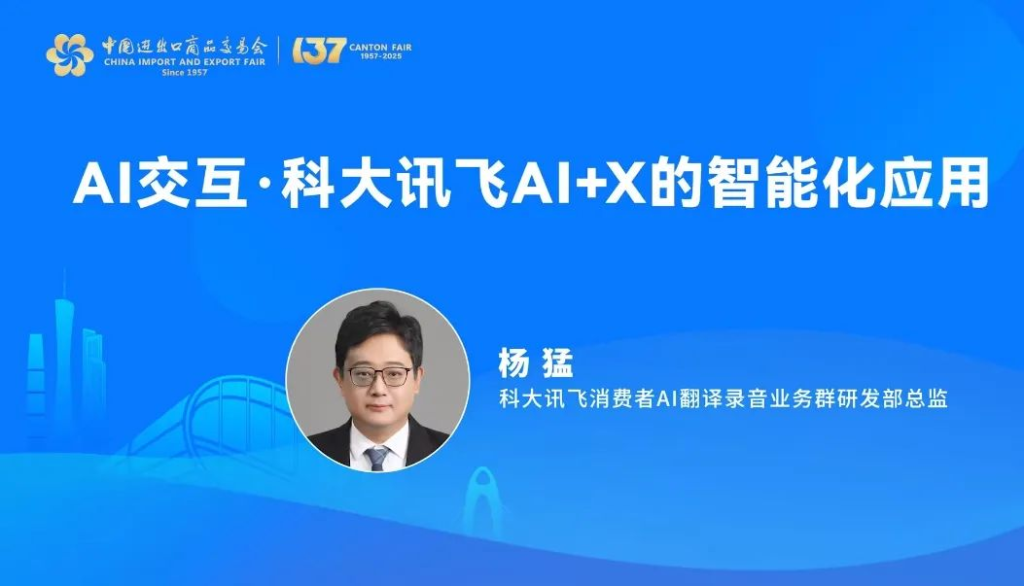
Yang Meng emphasized that just as “Internet+” revolutionized industries 20 years ago, “AI+” is now irreversibly restructuring productivity toolchains, with “X” as the unknown variable catalyzing new quality productive forces through industrial convergence. From speech recognition to multimodal large models, and from breakthroughs in high-noise environments to emotionalized interactions, these advancements not only demonstrate AI’s journey from lab to industrial core, but also showcase how Chinese AI enterprises are leveraging technological prowess to seize the global competitive high ground.

Yang Meng stressed that the key to successful AI implementation lies in establishing a synergistic “technology-scenario-ecosystem” linkage effect. Only through persistently tackling extreme scenarios, deepening vertical industry integration, and building open ecosystems can AI technology truly evolve from “usable” to “user-friendly,” ultimately achieving the critical transition to “industrially indispensable.”
Canton Fair Industry Forum
Each edition of the Canton Fair organizes industry forums, adhering to the principle of “specialized yet refined, compact yet impactful – focusing on practical value and tangible benefits for enterprises.” Aligned with the Fair’s exhibition themes, these forums address cutting-edge international trade and industry trends, featuring in-depth insights from top think tanks, industry associations, financial institutions, and market research firms. They facilitate connections between businesses and emerging channels like cross-border e-commerce and industrial internet, while driving high-quality foreign trade development and empowering enterprises to navigate risks and seize opportunities.
For collaboration:
Email: forum@cantonfair.org.cn
Contact: Li Xinyi
Tel: 020-89138040





